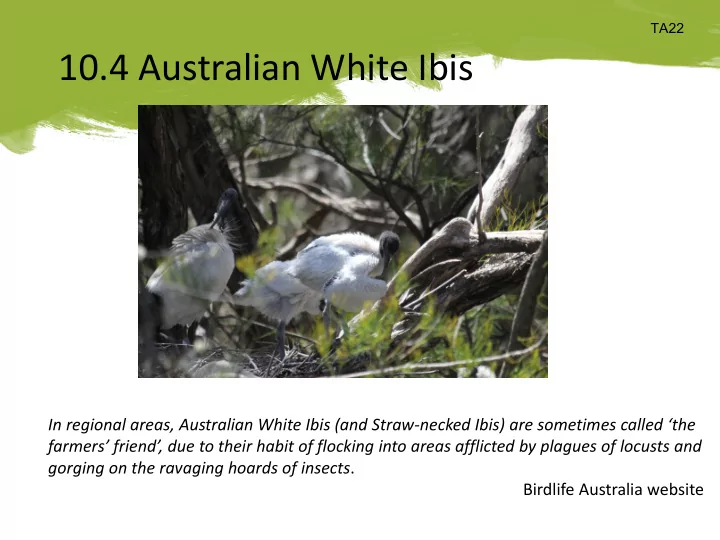

TA22 10.4 Australian White Ibis In regional areas, Australian White Ibis (and Straw-necked Ibis) are sometimes called ‘the farmers’ friend’, due to their habit of flocking into areas afflicted by plagues of locusts and gorging on the ravaging hoards of insects . Birdlife Australia website
TA23 Status • Protected native species • Considered by Department of Parks and Wildlife to be a “Pest Species” • “Damage licence” only approved as a last resort eg. Perth Airport due to bird strike risk
TA24 Summary of issue • Present in increased numbers in urban areas around Australia • Feed on terrestrial and aquatic invertebrates and food scraps • Scavenge at rubbish tips and in city parks • Travel hundreds of km per day; visiting multiple sites to feed, nest, roost and loaf (rest) • Visit Tomato Lake to breed • No evidence of negative impact to other fauna / vegetation at Tomato Lake (i.e. healthy turtle population, breeding spoonbills, vegetation recovers annually) • No feasible method of control at Tomato Lake (egg oiling, nest tipping or culling) • No legislation exists prohibiting feeding
TA25 What does the City do? • Regularly removes litter from parks • Contacts residents to discourage feeding of ibis (and other wildlife) • Participates in the EMRC’s Healthy Wildlife, Healthy Lives project • Keeps informed of new information available through: – Perth Airport Bird and Animal Hazard Management Advisory Committee – Australian White Ibis Study coordinated by the Mindarie Regional Council
TA26 What can the community do? • Reduce organics (food waste) disposed to landfill – Compost bins and worm farms - Civic Centre front counter – Discounts on worm farms, compost bins and bokashi buckets through Switch your thinking’s Rewards for Residents Program • To reduce the food available to ibis, park visitors are encouraged to: – Wrap any food scraps and place in a bin immediately – Not to feed the ibis or any other waterbirds. • Advice to residents – Department of Parks and Wildlife Australian White Ibis “Living with Wildlife” fact sheet available at www.dpaw.wa.gov.au – Brisbane City Council website on how to deter ibis from residential property
TA27
Recommend
More recommend